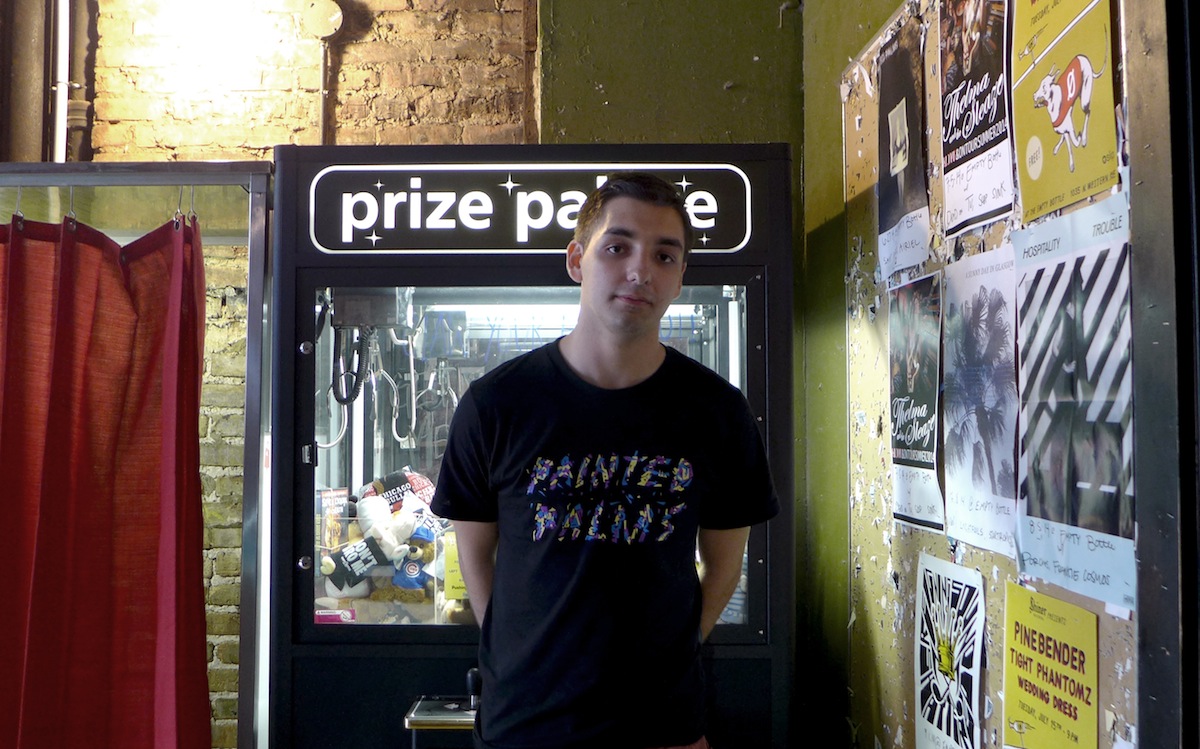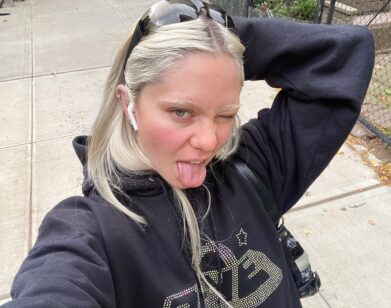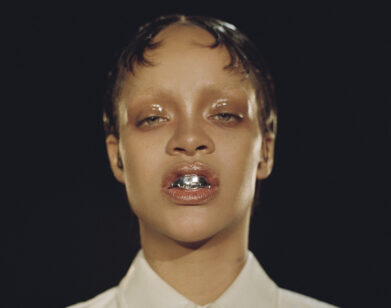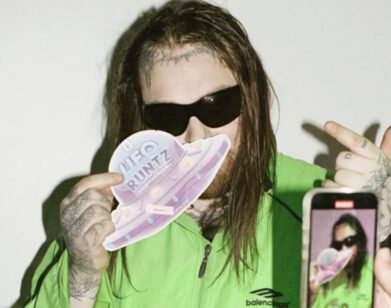Saint Pepsi’s Sugar Rush

ABOVE: RYAN DEROBERTIS, AKA SAINT PEPSI. PHOTO BY SASHA GEFFEN
Ryan DeRobertis doesn’t mind if you mention vaporwave, though it’s not a label he’d choose for himself. He doesn’t even like being grouped in under the term “producer.” He’s drawn simply to “pop,” a word that’s simultaneously punchier and more expansive than any of the neologisms that have been heaped upon the music he makes as Saint Pepsi. See him live, and it clicks; he twirls knobs behind a MacBook with the kind of verve that belongs in stadiums. He makes music for the sugar of it.
Since he started releasing his crackling disco collages online in 2012, Saint Pepsi has slowly permeated the music-obsessive corners of the Web. His remix of Carly Rae Jepsen’s chart-topping “Call Me Maybe” rippled through SoundCloud in 2013, and early this year, the offbeat bubblegum single “Mr. Wonderful” caught the ear of Todd Hyman, founder of Carpark Records. Now, Saint Pepsi has released the first single to feature his original vocals: “Fiona Coyne,” a tribute to a character on Degrassi that’s quickly become an underground favorite of the summer.
DeRobertis is currently at work on his debut full-length for Carpark. We chatted with him about his career so far at Chicago’s Empty Bottle just before his performance opening for tourmates Painted Palms.
SASHA GEFFEN: You were at Boston College for some time. Are you from Boston originally?
RYAN DEROBERTIS: No, I’m from Long Island, New York. I graduated high school in 2011 and went to BC until 2013. I hated it there. I was finally working on music and I was like, this is what I want to do. There’s a particular type of people who go to BC. I didn’t know that. It was just the best school I got into.
GEFFEN: Did you have a moment when you decided, okay, it’s time for me to just do music now?
DEROBERTIS: The decision to actually go forward with music didn’t happen until later. I had already really fucked up in college. I was doing Saint Pepsi for a while, but it wasn’t anywhere near the extent it is now. When I dropped out of school, it made me reevaluate the path I was going down. I was like, well, if I’m going to spend all this time doing music, then I might as well be really good at it instead of just hiding behind an aesthetic. I was working on music that initially served as something to distract me, and then I realized that it was cathartic, too.
GEFFEN: You’ve gone from making music as a distraction to signing to Carpark.
DEROBERTIS: Yeah. Not anything I thought I’d be able to say.
GEFFEN: How did that come about? They have electronic artists on their roster but none that have been associated with Internet-based genres like vaporwave.
DEROBERTIS: It’s funny. I started doing electronic music only because I heard Causers of This by Toro Y Moi. It’s one of my desert-island albums. He was actually my first concert in Boston. When I was a kid, my dad took me to see Depeche Mode and Duran Duran, but I never got to go into the city to see any shows. So the first one I went to was Toro Y Moi at the Paradise Rock Club. It was super impactful. I remember him staying after the set to talk to people. I didn’t think that artists did that at the time because I’d only seen big budget acts. Here was somebody I saw as a god and he’s just coming down, like, “I’ll take a picture with you, I’ll sign autographs.” It changed the way I saw myself. If I was an artist, I wanted to be that kind of person.
But the Carpark story: I put out the song “Mr. Wonderful” in January and it was played on Gorilla Vs. Bear’s Sirius XM show, and the next day I got an email from the owner of Carpark. I ended up meeting with him in the city in January—I was also meeting with some other labels at the time, who were great, but wanted to pigeonhole me in the “producer scene.” I was gunning for being looked at as a songwriter, an artist. Todd was the only person who was just like, “We’ll put out any album that you’re comfortable doing. If you’re behind it, then we’re behind it.” You don’t really hear that from people. Usually they want to have a say in it. Even when I was releasing with Internet labels, there was that superiority complex that comes with being in charge. You think you can have control over somebody else’s art.
GEFFEN: Do the songs on your new 7-inch appear on the full-length you’re working on?
DEROBERTIS: Yeah, those are going to be there. The record is inspired in form by a lot of New Wave records. Duran Duran’s Rio is sort of the archetype for this album. Something that’s kind of short. Duran Duran used to do these things called “night versions”: they’d go into the studio and they’d re-record “Girls on Film” and really isolate each part of the rhythm section so that you could go to a club and hear an 8-minute version of “Girls on Film” with a really big drum break. I’d like to make that possible so that when people come see the live show it’s not me standing in front of a computer singing over the songs; it’s something that’s a lot more interactive.
Other than that, the album has a theme. I hate saying it’s about nostalgia, because everybody’s making something about nostalgia, but my album is sort of about the narcissism that comes with nostalgia. You have to have some sort of audacity to claim a certain time as “the best” and throw out everything in the present and everything in the future. I was occupying that headspace for a long time. This album is me stepping out of that mindset. Sometimes it’s tongue-in-cheek. I try to keep the lyrics poppy. Nothing too heady, but things have double meanings to them. I like to poke fun at myself; I’m really self-deprecating. That’s where the album lies lyrically. It’s made the aesthetic of sampling kind of fun, too.
GEFFEN: Right, because that’s so rooted in nostalgia.
DEROBERTIS: Especially a nostalgia that I don’t have firsthand. I did grow up declaring the ’80s to be the best time. It’s funny. You grow up and you snap out of it a little bit.
GEFFEN: When did you find yourself looking back at the era you used to identify with and realizing that it wasn’t actually better than what’s happening now?
DEROBERTIS: It was around the end of my sophomore year of college. That’s what it took for me to question things. In high school, I was super straight-edge. I thought that anybody who smoked or drank was a horrible person. That’s just how I was, how I was raised to be. My parents didn’t want me to get into any of that stuff. But then I found my way into some stuff—nothing that really ever put me in danger, but with that change comes a change in perspective. I became a lot more open-minded, or laissez-faire, anyway. I started getting more frustrated with how my parents talked about people who would experiment with anything, like curiosity is something to be ashamed of. For a while, I was just going back and thinking about how different things would have been if I wasn’t such an uptight turd. Maybe I could have gotten into what I do now earlier. I wouldn’t have been writing fake Oasis songs at 15. But after a while, it’s just like, what are you going to do? It was just something that happened and it’s over and you move on. Life happens.
GEFFEN: What have you learned about your music on this tour?
DEROBERTIS: I learned that people want to have fun as a general rule. A lot of my live set is halfway between my music and Top 40. I don’t do it to be ironic. I do it because there’s a widespread appeal in that type of music. I just want people to walk away from it happy—that euphoric feeling that you get when you’re at a high school dance, if you didn’t hate high school. That’s how it was with Toro when I saw him in concert. I couldn’t even think about how much my feet were hurting because of how much fun we were having. I just want to get people to let loose and not feel like they have to sit by the bar the whole show, not feel like they have to come up with excuses why they like a certain song on the radio. I want to move past that so we can move forward. If there’s something to be said about the evolution of pop music, there’s nothing we can do about it until we understand why people like what they like. When you become open-minded about it, you start writing for people instead of for you. I think that irony is boring now. It’s very rare that you see an artist that’s super sincere in every way—with their music, with their personality. I want to be that for somebody. Somebody that you could say, “I think his music sucks, but at least he’s a really nice guy. He talks to people after shows.”
SAINT PEPSI’S FIONA COYNE/FALL HARDER 7-INCH IS OUT TOMORROW, AUGUST 12. FOR MORE ON THE ARTIST, PLEASE VISIT HIS FACEBOOK PAGE.






